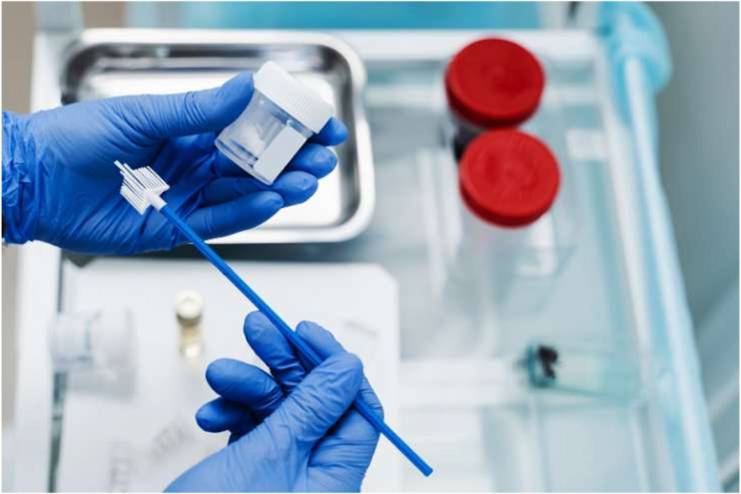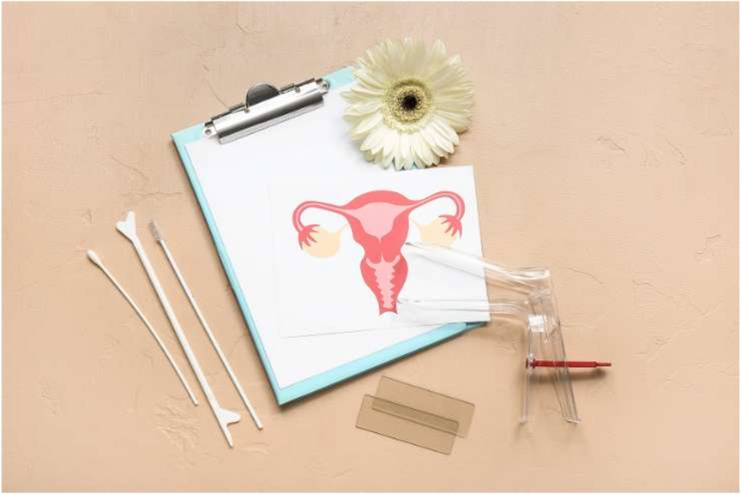Affiliate Disclaimer
Some links in this article are affiliate links. We may earn a small commission if you make a purchase through these links, at no extra cost to you. We only recommend products we find useful to our readersCervical cancer is a serious health risk affecting the lower region of the uterus. It has a significant impact on a woman’s reproductive system and general health if not identified and treated promptly. Early detection, which significantly increases survival rates and treatment outcomes, is crucial. Routine Pap smears, a simple screening procedure, play a vital role in detecting precancerous changes and early-stage cervical cancer, enabling prompt treatment.
This article aims to underscore the life-saving potential of routine Pap smears by highlighting their contribution to women’s health and the prevention of cervical cancer.
What is a Pap Smear?
A Pap smear is a preventive health test that can identify abnormal cells in the cervix. The primary objective of a Pap smear is to detect precancerous alterations and early-stage . During treatment, a healthcare expert gently removes cells from the cervix using a small brush or spatula, enabling timely intervention and therapy. Subsequently, these cells are analyzed under a microscope to detect any abnormalities.
It is impossible to stress the significance of Pap smears in accurately identifying precancerous alterations and cervical cancer at an early stage. Early identification, which can be accomplished through routine cervical screening, can greatly increase the likelihood of effective treatment.
This can also prevent the development of cancer from aberrant cells. Maintaining a regular Pap smear is an essential component of preventive health care.
Also, read: Unlocking Wellness: 7 Essential Health Screenings Every Woman Should Prioritize
How Often Should You Get a Pap Smear?

It is crucial to thoroughly understand the Pap smear frequency to maintain appropriate preventive care. The Pap smear should be performed every three years on women between the ages of 21 and 65, according to general standards. On the other hand, this frequency can change depending on age, health history, and risk profiles. Women between the ages of 30 and 65, for instance, might choose to undergo a combined Pap smear and HPV test once every five years. There is a possibility that individuals who have a history of cervical abnormalities, immune systems that are compromised, or other risk factors will require more regular testing.
It’s important to remember that guidelines for Pap smear frequency can vary, and individual needs may differ. Therefore, it’s highly recommended to consult a healthcare professional to establish a personalized screening schedule. They can provide tailored advice based on your specific health status, ensuring you adhere to the most suitable cervical screening guidelines for optimal preventive care.
Benefits of Regular Pap Smears
Pap smears have a wide range of benefits, notably in cancer prevention and early detection. Using Pap smears regularly, abnormal cell changes in the cervix can be detected early, typically before they develop into cancer. This early discovery is significant because it enables rapid and successful treatment, dramatically improving the number of surviving people. Studies have indicated that conducting Pap screenings regularly can reduce the risk of developing cervical cancer and the mortality by at least 80 percent.
Pap tests play a crucial part in identifying and treating precancerous alterations at an early stage to prevent cervical abnormalities from developing into cancer. The advantages of Pap smears go beyond preventing cancer; they also offer women the opportunity to feel at ease and contribute to their overall health by ensuring that potential problems are identified and addressed early. Maintaining a constant Pap smear schedule is vital, as regular screenings are essential to preventive health care. This highlights the necessity of maintaining a regular screening plan.
Understanding Pap Smear Results

It is crucial to understand your cervical health so that you can interpret the Pap smear results appropriately. A Pap smear can classify results into one of three categories: standard, abnormal, or inconclusive. According to the expected results, no abnormal cells were found, and it is recommended that routine screening methods be maintained.
On the other hand, abnormal results may suggest the presence of atypical cells, which may be precancerous or cancerous under certain circumstances. It is essential to remember that aberrant results do not necessarily indicate the presence of the cancer; however, they do call for additional examination. Inconclusive results suggest that the test may need to be repeated with another Pap smear for clarity.
When abnormal results are obtained, it is essential to conduct follow-up tests. A healthcare provider may recommend the additional testing, such as a colposcopy, for a more in-depth examination of the cervix. The medical professional utilizes a specialized microscope to examine the cervix and identify any abnormalities that may be present. A biopsy, which involves the removal of a tiny sample of tissue, may also be performed to provide a conclusive diagnosis.
Thoroughly understanding the results of Pap smears and the necessity of follow-up testing ensures early intervention and successful management of any concerns. This understanding also reinforces the significance of performing frequent cervical screenings.
Overcoming Common Concerns and Myths

Women are frequently discouraged from undergoing routine cervical cancer screening due to Pap smear concerns. Many people commonly worry about discomfort during the surgery and anxiety about the outcomes. Although there is a possibility of experiencing some discomfort, the operation is often short and does not cause any pain for the majority of women. It is possible to decrease the fear of findings by understanding that aberrant results do not necessarily indicate the presence of cancer and that early discovery increases the likelihood of effective therapy.
Additionally, several myths and misconceptions about Pap smears and cervical cancer screening need to be dispelled.
- One of the most common misconceptions is that Pap smears are not essential if you are in good health. Pap smears can detect changes that are not yet manifesting symptoms.
- In addition, there is a common misunderstanding that Pap smears are only advised for sexually active women. Still, they are recommended for all women who fall within the age range for screening.
- Make an effort to schedule the appointment when you are calm and relaxed, and discuss any concerns you may have with healthcare practitioners. It will help you feel less anxious.
- Participating in deep breathing exercises and maintaining an awareness of the procedure are two more ways to assist in getting ready for the exam.
Understanding the significance of Pap smears and the procedure involved can overcome these worries and ensure that frequent cervical cancer screenings are performed.
Who Should Get Regular Pap Smears?
Pap smear eligibility extends to a broad range of women, emphasizing the importance of cervical cancer risk management and adherence to screening recommendations. Regular Pap smears should be a priority for all women between the ages of 21 and 65. Because women who have a family history of cervical cancer or other risk factors may be at a higher risk for developing cervical abnormalities, this is of the utmost importance.
It is essential for women who engage in sexual activity to have frequent cervical cancer screening. This is because sexual activity raises the probability of being exposed to human papillomavirus (HPV), which is a primary factor in the development of cervical cancer.
Furthermore, it is recommended that women who have been vaccinated against HPV continue to undergo Pap screens every quarter. Although the HPV vaccine offers protection against specific strains of the virus, it does not protect against all forms of the virus that might lead to cervical cancer. As a result, Pap smears continue to be an essential preventative measure for all women who fall within the indicated age range. This helps to ensure that cervical health is well managed and that early detection is achieved.
Also, read: 7 Habits That Can Hinder Your Mental Sharpness as You Age
How to Schedule and Prepare for a Pap Smear

Scheduling a Pap smear takes little time and effort and is essential to preventive health care. Take the first step toward scheduling an appointment by contacting your healthcare physician or gynecologist. Numerous clinics provide online scheduling alternatives for patients’ convenience.
This ensures that the findings of a Pap smear preparation are accurate and essential. Avoid intercourse, douching, and the use of vaginal medicines twenty-four hours before the test, as they can affect the accuracy of the sample. It can also affect the results, so make sure to schedule your visit for a period when you are not experiencing menstruation.
It would help to lay on an examination table with your feet in stirrups while the treatment is done. To collect cells from the cervix, the healthcare professional will introduce a speculum, which will then be used to open the vaginal walls gently. A healthcare provider will collect the cells with a small brush or spatula.
The process is rapid, typically taking only a few minutes, and although it may cause some moderate discomfort, it should not be an unpleasant experience. As a natural side effect of the Pap smear, you can have some minor spotting after the procedure. Your healthcare physician will let you know when you can anticipate receiving your results and will discuss any necessary follow-up steps.
Conclusion
In conclusion, routine Pap smears are essential for early detection and prevention of cervical cancer. The significance of Pap smears, appropriate screening frequency, comprehending results, and overcoming typical worries were all emphasized in this article. Frequent screening improves treatment outcomes considerably by enabling early intervention.
We urge readers to prioritize their health by scheduling regular screenings and speaking with their healthcare providers. Visit our article to learn more about the most recent developments in preventive healthcare, including tips on preventing cervical cancer and the value of Pap screenings.
References
- https://www.mayoclinic.org/tests-procedures/pap-smear/about/pac-20394841
- https://www.cancer.gov/publications/dictionaries/cancer-terms/def/pap-smear
- https://my.clevelandclinic.org/health/diagnostics/4267-pap-smear
- https://www.webmd.com/women/pap-smear
- https://www.healthline.com/health/pap-smear-pap-test-what-to-expect
- https://www.lancastergeneralhealth.org/health-hub-home/2023/june/how-often-should-you-get-a-pap-test-to-prevent-cervical-cancer
- https://www.sharp.com/health-news/how-often-do-i-need-a-pap-test
- https://www.acog.org/womens-health/experts-and-stories/the-latest/why-annual-pap-smears-are-history-but-routine-ob-gyn-visits-are-not
- https://cancer.ca/en/cancer-information/find-cancer-early/get-screened-for-cervical-cancer/benefits-and-limitations-of-screening-for-cervical-cancer
- https://www.greeceobgyn.com/4-benefits-of-getting-a-pap-smear
- https://www.cancer.gov/types/cervical/screening/abnormal-hpv-pap-test-results
- https://www.cancer.org.au/cancer-information/causes-and-prevention/early-detection-and-screening/understanding-your-cervical-screening-test-results
- https://www.stlukeshealth.org/resources/guide-to-understanding-pap-and-hpv-test-results
- https://www.cancer.gov/types/cervical/screening/abnormal-hpv-pap-test-results/understanding-cervical-changes.pdf
- https://www.jostrust.org.uk/professionals/cervical-screening/barriers
- https://www.jostrust.org.uk/professionals/cervical-screening/myths-facts
- https://www.mountsinai.org/about/newsroom/2018/ten-common-myths-about-pap-smears-that-you-should-stop-believing-savanna-swain-wilson
- https://www.parkwaycancercentre.com/sg/news-events/news-articles/news-articles-details/5-myths-about-cervical-cancer-screening
- https://phelpshealth.org/news/featured-stories/how-prepare-your-pap-smear
- https://www.njbestobgyn.com/2023/05/19/how-to-prepare-for-a-pap-smear-test
- https://ntmconline.net/how-to-prepare-for-a-pap-smear
- https://ketteringhealth.org/preparing-for-your-pap-smear
In this Article



















